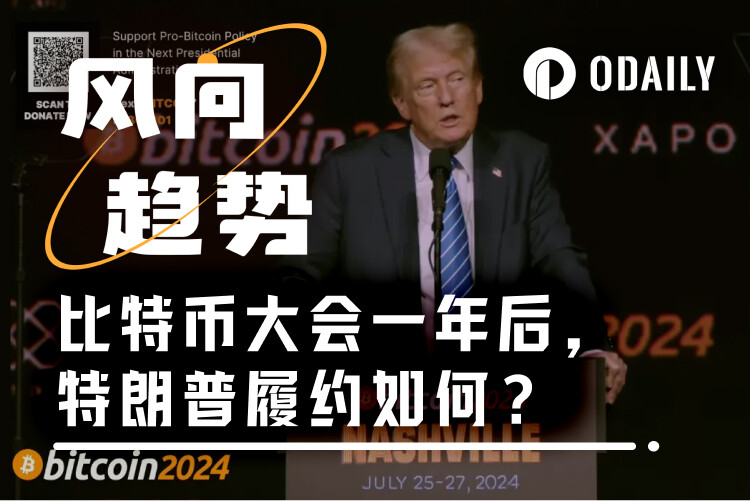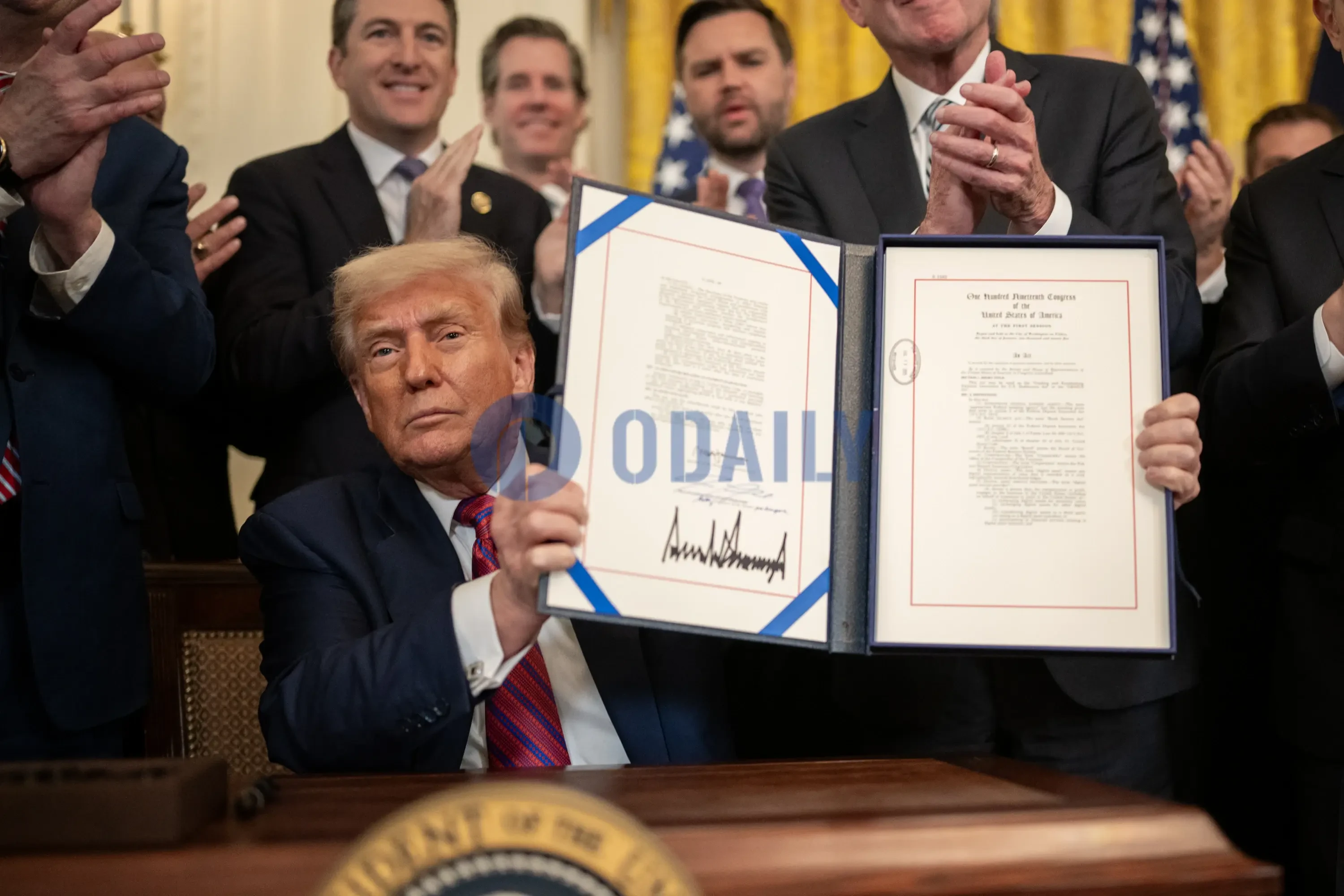One year after the Bitcoin conference, has Trump’s promise come true?
- Core point: Trump's encryption policy has been partially fulfilled, but progress has been mixed.
- Key elements:
- Fire SEC Chairman Gensler and withdraw proposals for stricter regulation.
- Establish a strategic Bitcoin reserve and retain government BTC holdings.
- The stablecoin bill was signed and the anti-CBDC bill is underway.
- Market impact: U.S. crypto regulation is loosening, which is good for the industry.
- Timeliness annotation: medium-term impact.
Original | Odaily Planet Daily ( @OdailyChina )
By Wenser ( @wenser 2010 )
In July 2024, Trump delivered an impassioned speech at the Bitcoin Conference in Nashville, Tennessee, confidently outlining his post-presidential "Crypto Policy 2.0" blueprint. It was then that the crypto community, comprising approximately one-fifth of the US population, gradually shifted to Trump's support, solidifying his significant advantage in last November's presidential election. A year later, more than six months after Trump took office, it's perhaps timely to review the implementation and progress of Trump's crypto policies since taking office to see if he has truly lived up to his promises and to shed light on the future direction of US crypto policy. Odaily Planet Daily will review Trump's crypto-related policies and legislation over the past six months for your reference.
The first thing he did when he took office was to fire Gary Gensler. Progress: Completed
According to the full text of Trump's Bitcoin Conference speech, compiled by Odaily Planet Daily, Gary Gensler, former SEC Chairman during the Biden administration, faced hostility and rejection from the cryptocurrency industry due to his extremely unfriendly approach to law enforcement. Consequently, he was targeted by Trump, who threatened to fire him on his first day in office and appoint a new, pro-cryptocurrency SEC Chairman.
So far, it seems Trump is following through on his words. On January 21st of this year, the SEC officially announced the departure of former SEC Chairman Gary Gensler . Furthermore, Gensler 's legacy was liquidated in June of this year . The SEC formally withdrew several proposed rules in mid-June that would have imposed stricter regulations on DeFi and cryptocurrency custody. These proposals were put forward under the leadership of former Chairman Gary Gensler, who led the agency's "enforcement and regulatory" approach. The withdrawn proposals included a proposed revision to Rule 3b-16 of the Exchange Act, issued in April 2023. This proposal sought to expand the definition of an exchange, specifically to include decentralized finance platforms under the regulation of national securities exchanges.
In this regard, Trump's firing of Gary Gensler is a welcome development.
Additionally, in March of this year, Coinbase launched an investigation into Gary Gensler's spending on crypto enforcement actions. The company stated that , through a Freedom of Information Act (FOIA) request, it was seeking information regarding all investigations and lawsuits related to the offer and sale, secondary market trading, staking, and lending of digital assets between April 17, 2021, and January 20, 2025. The request included the number and names of investigations and enforcement actions during that period, as well as information on SEC employees and contractors, including work hours and compensation, and the budget and compensation details of the SEC's Crypto Assets and Cyberspace Division. As of July 31, 2025, the SEC had not responded to Coinbase's FOIA request or disclosed specific spending data. Therefore, the investigation has not yet produced any public results.
The second thing he did after taking office was to establish a government strategic reserve of Bitcoin. Progress: completed in stages
The second major point Trump mentioned at last year’s Bitcoin conference was the “Bitcoin strategic reserve” issue that the crypto industry is extremely concerned about.
According to the original information of "Full Text of Trump's Bitcoin Conference Speech" , Trump's original words were: "The United States will retain 100% of all Bitcoin currently held or acquired in the future. We will retain 100%." He also mentioned "ensuring that the United States becomes the global capital of cryptocurrency and the world's Bitcoin superpower."
Now, this commitment has been fulfilled in stages.
In early March of this year, Trump signed an executive order to establish two different digital asset storage mechanisms, including:
1. The Strategic Reserve only stores Bitcoin (BTC), which is considered the best store of value digital asset.
Initial funding source: approximately 200,000 bitcoins acquired by the government through criminal and civil forfeiture over the years;
Unique authorization: Treasury Secretary Bessent and Commerce Secretary Lutnick are authorized to explore ways to acquire more Bitcoin without increasing taxpayer burden. It is positioned as a national digital value reserve.
2. The Digital Asset Stockpile contains digital assets other than Bitcoin - which may include XRP, ADA, ETH, SOL and other assets
The Treasury Department is responsible for the "responsible management" of government digital assets. The government will only explore budget-neutral means to purchase more Bitcoin and will not actively seek to increase the amount of other digital assets in the reserve. The executive order also requires a comprehensive audit of all current government digital assets to ensure transparency in asset management.
In other words, although the national-level Bitcoin strategic reserve promoted by the US government is still in progress and has not brought new market buying, past BTC holdings have been part of the reserve. Trump once said in June that creating a Bitcoin strategic reserve is not enough, and vowed to establish a "clear and simple market framework" to ensure the United States' dominance in Bitcoin and cryptocurrencies.
The third thing he did after taking office was to end "Operation Choke Point 2.0"; ban CBDC (central bank digital currency) and establish a stablecoin regulatory framework. Progress: Appointment of White House AI and cryptocurrency chiefs; Anti-CBDC bill passed the House vote; GENIUS Act approved as statute
Last year, Trump made statements regarding the cryptocurrency industry's previous banking crackdown, "Operation Choke Point 2.0," and CBDC (Central Bank Digital Currency). Now, his statements have become a reality.
At last year's Bitcoin conference, Trump boasted: "As president, end 'Operation Choke Point 2.0' immediately. They want to kill your business. We won't let that happen. Your government will never again sit idly by and watch Bitcoin jobs and businesses flee to other countries because U.S. laws are too unclear, too harsh, too angry, and too rigid. We will keep every Bitcoin job in the United States. That's what we're going to do. As soon as I take office, I will immediately establish a Presidential Advisory Committee on Bitcoin and Cryptocurrency."
At present, this matter can only be said to be partially completed: on the one hand, the dirty work between Gemini and the American investment bank giant JPMorgan some time ago still exposed the "financial persecution" of cryptocurrency platforms by the US banking industry (see the article "Gemini was "choked" by JPMorgan Chase again, and the founder angrily accused the bank of launching "financial persecution 2.0" ); on the other hand, Trump had previously appointed David Sacks as the White House AI and cryptocurrency director, in charge of cryptocurrency policy research and formulation.
In addition, regarding Trump’s previous statement that “the United States will never be allowed to establish a CBDC” (his original words were: “They want to move in the direction of creating a central bank digital currency. Forget it. When I am President of the United States, there will never be a central bank digital currency. I will always defend the right to self-custody and self-sovereignty”), one of the three major encryption bills, the “Anti-CBDC Surveillance State Act” (numbered S.1124), has passed the House of Representatives vote and was sent to the Senate for deliberation. It will still need to wait for the Senate vote and, like the stablecoin regulatory bill “GENIUS Act”, it will officially become law after being signed by Trump.
On July 19th, US President Trump officially signed the GENIUS Act, marking the first federal regulation related to crypto assets. The act requires stablecoins to be 100% backed by US dollars or its equivalent in liquid assets, conducts annual audits for issuers with a market capitalization of over $50 billion, and establishes regulatory guidelines for overseas issuance. Executives from Circle, Tether, and Coinbase attended the signing ceremony, with Trump declaring the move "establishing America's dominance in global finance and crypto technology."

Trump signs GENIUS Act
Fourth priority: ensuring the United States becomes the global cryptocurrency capital and Bitcoin superpower. Progress: Not yet completed.
Finally, the most important promise is what Trump once proposed: "ensuring that the United States becomes a global encryption system and Bitcoin superpower." At present, there is still a long way to go.
On the one hand, the Federal Reserve has not yet relaxed its stance on interest rate cuts, and the liquidity of the crypto market is relatively limited. On the other hand, despite the listing of Circle, the "first stablecoin stock," and a surge in cryptocurrency reserves among US-listed companies, the United States is still some distance away from fully liberalizing unnecessary cryptocurrency regulation.
Furthermore, the "tariff trade war" launched by Trump in April of this year has also, to some extent, hindered the realization of this vision. After all, as a crucial component of the global economic system, the impact of US tariff policies is multifaceted, and the ever-changing tariff policies make it difficult for global capital to confidently participate in the US cryptocurrency market liquidity.
Meanwhile, looking back at Trump's speech at last year's Bitcoin conference, we belatedly realize that Musk, once a key political ally, was destined to part ways with Trump. He once said, "Not everyone has to own an electric car. I told him (Musk). So we're going to remove the mandate. Some people like gasoline cars, some like hybrids, and some like electric cars. They're all good. I think what Elon is doing is great, and he understands it. If he didn't, he probably wouldn't support me." Now, with the "Big, Beautiful Act" gradually coming to fruition, it seems a sad state of mind.
Of course, making the United States the global capital of cryptocurrencies is not something that can be accomplished overnight. Whether Trump can successfully fulfill his promise during his term will be determined by three criteria:
The first is when the US government will be able to purchase the first BTC in the name of the federal government;
Second, whether the proportion of companies in the U.S. stock market that have established cryptocurrency treasury reserves can achieve a breakthrough leap;
Third, whether the size of the cryptocurrency market can rely on the US market to achieve exponential growth again.
If at least two of the three standards are achieved, the "global crypto capital" or "Bitcoin superpower" that Trump once mentioned can be considered a successful realization. Otherwise, more work is needed.



